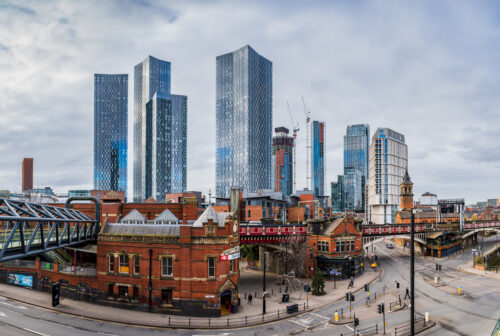Stamp duty and the London Plan – Recapping the Conservative Party Conference

From headlines describing “sad, empty and haunted by Margaret Thatcher” to the somewhat more optimistic “Kemi Badenoch rides Tory conference high – for now”, the Conservative Party conference in Manchester certainly generated mixed reviews. Yet beyond the optics, the party outlined policy positions with significant implications for housing and energy. As the Conservatives recalibrate in opposition, several key announcements merit attention from those working in the built environment sector.
A party repositioning
Leader Kemi Badenoch used the conference platform to set out the Conservative vision for returning to power, promising to reverse a series of Labour policies whilst unveiling their own distinctive approach to housing, taxation and energy. The overarching narrative was one of cutting red tape, reducing costs and prioritising development over regulation.
The stamp duty gambit
The biggest headline from Badenoch’s speech was her pledge to abolish stamp duty if the Conservatives win the next general election.
The party estimates abolishing stamp duty on main homes after 2029 would cost the Treasury £9bn annually. Critics argue this policy would primarily benefit wealthier buyers, though the Conservatives frame it as removing a barrier to home ownership and increasing market liquidity.
Badenoch also committed to reversing Labour’s inheritance tax changes on family farms, the so-called “tractor tax”, signalling the party’s willingness to challenge recent fiscal policy across property and land taxation.
Unlocking London’s housing potential
Shadow Housing Secretary Sir James Cleverly outlined plans to rewrite the London Plan, arguing it would unlock tens of thousands of new homes. His vision emphasises delivery over process, focusing development near transport links, the night-time economy and employment opportunities.
He cleverly championed brownfield site prioritisation, citing previous Conservative successes at Canary Wharf and the Olympic Park as models for transforming brownfield land into thriving business and housing hubs. This represents a clear emphasis on urban regeneration and maximising existing infrastructure rather than greenfield expansion.
Rolling back green energy
The Conservatives announced plans to scrap carbon pricing and what they termed “rip-off wind subsidies”, claiming these add 20% to electricity prices. This marks a significant shift from green energy commitments, positioning energy affordability as an emerging election battleground.
The promise to roll back green energy rules to reduce household costs suggests a Conservative approach that prioritises immediate cost reduction over longer-term environmental targets. This creates a stark contrast with both Labour and Green Party positions on renewable energy infrastructure.
Looking ahead
The Manchester conference revealed a Conservative Party attempting to define itself in opposition through a combination of tax cuts, deregulation and challenges to Labour’s policy direction. The conference’s core themes were clear: reduce costs for homebuyers through stamp duty abolition; unlock housing delivery by rewriting the London Plan and prioritising brownfield sites; and roll back environmental regulations in favour of lower energy bills.
Whether this is framed as pragmatic cost-reduction or short-sighted policy reversal depends largely on political perspective. What’s certain is that the Conservatives are positioning themselves as the party of development over regulation, immediate affordability over long-term sustainability and market freedom over planned intervention.
